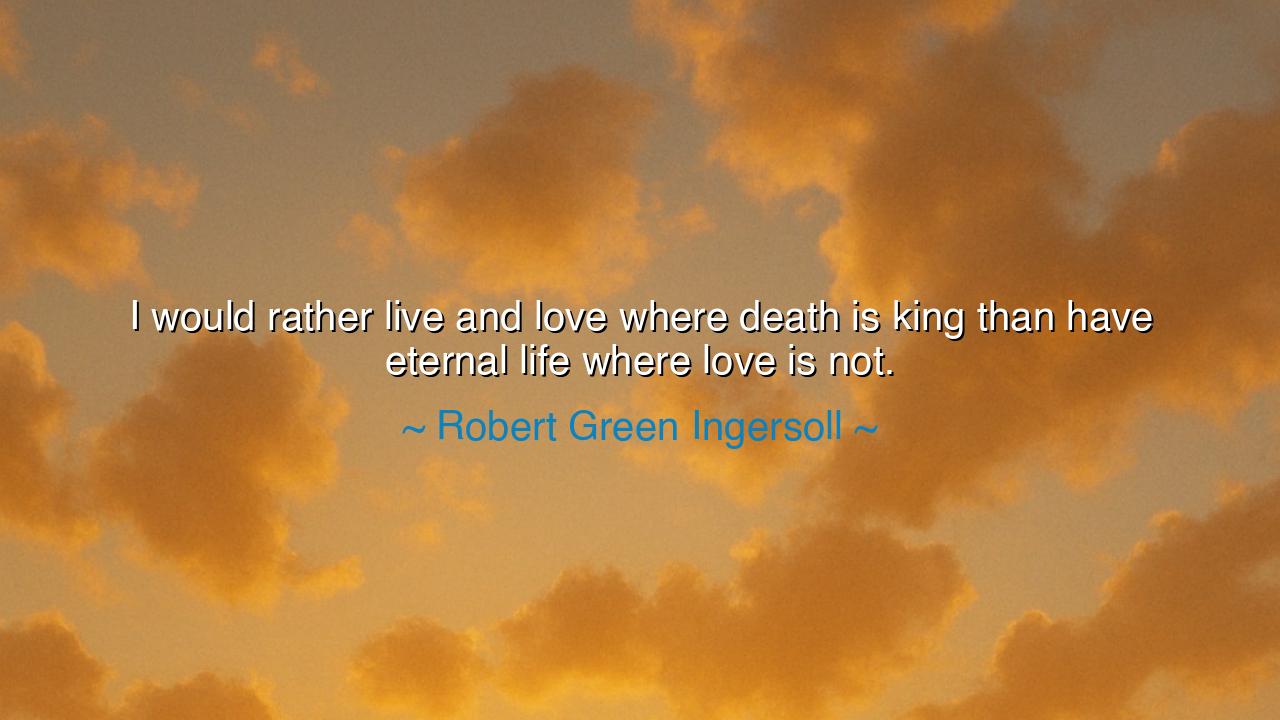
I would rather live and love where death is king than have
I would rather live and love where death is king than have eternal life where love is not.






“I would rather live and love where death is king than have eternal life where love is not.” These words of Robert Green Ingersoll, the great orator and freethinker of the 19th century, shine like a flame against the darkness of fear and dogma. Ingersoll, who defied the rigid doctrines of his time, speaks here of a truth so radiant that it transcends religion, philosophy, and even the boundaries of mortality. He declares that love—not immortality, not heaven, not divine promise—is the highest good. For what is life eternal, if it lacks the warmth of love? To dwell forever in a loveless paradise would be a kind of death, while to love deeply, even in a world ruled by death, is to taste eternity in a single heartbeat.
The origin of this quote can be traced to Ingersoll’s reflections on religion and the human spirit. Living in an age when many sought comfort in the promise of an afterlife, he questioned the value of eternity if it were stripped of compassion and affection. His was the voice of the humanist — bold, tender, and unafraid. Ingersoll saw love as the divine spark within man, the force that makes life sacred. Death may reign in this world, he admits, yet within that brief reign, love transforms existence into something immortal. Thus, he chose the mortal realm of passion over the cold eternity of perfection without feeling.
When he says, “where death is king,” he acknowledges the inevitability of mortality — the shadow that falls upon all living things. Yet in that shadow, he finds meaning. Death, to him, is not the enemy; lovelessness is. The heart that loves knows the fragility of its joy and loves all the more fiercely for it. There is courage in loving when loss is certain, beauty in caring when time is short. This is what Ingersoll offers us — not a promise of everlasting life, but the eternal moment, made sacred by love’s fire.
The ancients, too, understood this truth. In the legend of Orpheus and Eurydice, love defies even the dominion of death. Orpheus descends into the underworld, singing to reclaim his beloved from the grip of Hades. Though he ultimately fails, his journey itself becomes immortal — for it is love, not success, that defines his greatness. Like Ingersoll, Orpheus teaches that to love and to risk loss is nobler than to live without love’s ache. Better to walk in the land of the dying, hand in hand with another soul, than to wander forever alone in a sterile eternity.
There is also a shadow of defiance in Ingersoll’s words — a refusal to accept a heaven built upon obedience rather than affection. He rejects the notion of a paradise purchased through the denial of life’s passions. His heaven is here, in the arms of those we love, in the laughter shared beneath the fading sun. Love, he says, is not a thing reserved for eternity; it is the essence that gives even the shortest life infinite worth. To him, the divine is not found in distance or permanence, but in the fleeting tenderness between two mortal beings.
And what of death, that “king” of all who live? Ingersoll does not tremble before it. For the one who has loved, death cannot erase what was felt. The poet John Keats, dying young, wrote, “A thing of beauty is a joy forever.” Though his body fell to dust, his love for beauty lives in every line of his verse. He, too, lived in the kingdom of death — and yet, through love, he became eternal. It is this paradox that Ingersoll celebrates: that love is stronger than immortality, because it is born of choice, not compulsion.
So, my listener, take this as a lesson for your own heart: do not fear the brevity of life; fear the emptiness of a life unloved. Seek not a heaven without love, but a life filled with it — even if it ends too soon. Love while you can, fiercely and sincerely, for in that love you conquer death itself. Be not seduced by dreams of eternal perfection, for the gods envy the passion of mortals who love despite their doom. Live fully, love deeply, and let your days burn bright in the kingdom of death — for there, among fleeting hearts, you shall find the truest form of eternity.






AAdministratorAdministrator
Welcome, honored guests. Please leave a comment, we will respond soon